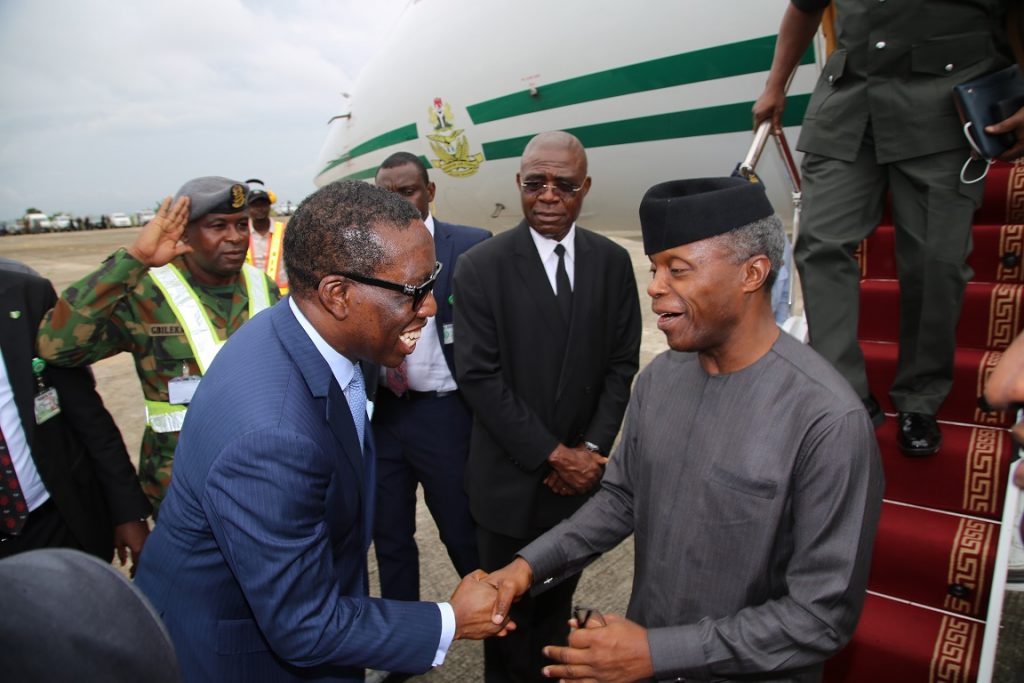Vice President, Prof. Yemi Osinbajo on arrival at Asaba Airport, is welcomed by Governor Ifeanyi Okowa of Delta state.
The Vice President, Prof. Yemi Osibajo has called for a paradigm shift in the operation of the state governments in sourcing for funds to help them raise the much needed money to enable them meet the obligation of government and governance.
He made the call today, at the Joint Planning Board (JPB) and National Council for Planning meeting that held at the Event Centre, Okpanam Road, Asaba, Delta State.
At the event which had as its theme: “State Fiscal Sustainability and Economic Diversification in Nigeria,” Prof. Osinbajo said lack of adequate funds has been the main challenge of governments, yet it remains the solution to the problems of development. “Raising revenue is both a challenge to states and the Federal Government, yet it remains the solution,” he said.

He said that the dependence on oil as the main source of funds has been a major disadvantage that has stunted economic growth because though the country earns more money from oil, but that it makes the people to depend on imports, makes a country to lose productivity, lose jobs, and the people become less interested in developing their economic potentials.
Osinbajo called for a paradigm shift since oil or any mono product at whatever price cannot deliver employment, it cannot provide infrastructure, and urged all state government to look at the need to look inwards to develop products in areas where they have comparative advantage.
The Vice President therefore, made some proposals that state governments can consider as possible means of increasing their revenue for their fiscal planning.
He said: “States must engage in well thought out strategic planning where every state must focus on areas of its comparative advantage.
“States must take advantage of the entrepreneurial spirit of Nigerians by giving them support. We found that providing solar power in markets helped to boost trader activities as it makes them more productive.
He also proposed that state governments can facilitate the laying of infrastructure for broad band opportunity without charging fees, thereby creating opportunity for small businesses to thrive. “The key thing is to think outside the box,’ Osinbajo said.
At the end of the meeting, a 15-point communiqués was issued, stating that:
• States were advised to adopt policies and business environment initiatives to improve Private Sector Investment and IGR generation, and key into the zero oil policy of the Federal Government.
• States should be encouraged to institutionalize effective Monitoring and Evaluation (M&E) system in their respective states.
• An inclusive institutional arrangement should be put in place to ensure follow-up of JPB and the Council’s recommendations going forward.
• Governments at all levels should create an enabling environment to drive commercial and modernized manufacturing, agricultural and mining practices so as to drive industrialization.
• Governments at National and sub-national levels should allocate more resources on the use of ICT in revenue collection, administration and ensure provision of adequate capacity for managing the system.
• Funds borrowed by the state governments should be invested in critical sectors such as infrastructure for improved economic performance and job creation: States should leverage on State Fiscal Transparency Accountability and Sustainability (SFTAS) project to improve public financial management systems and processes in Nigeria.
• There should be reform of Federal and State Public Financial Management laws to achieve better accountability and transparency and key into the fiscal management tools developed by Partnership to Engage Reform and Learn (PERL).
• A National Strategic Framework for the Bio-Economy in Nigeria should be put in place to ensure effective coordination of the ecosystem so as to facilitate job creation and economic growth.
• States are encouraged to identify areas of their comparative advantage and undertake a well thought out strategic planning.
• The need for in-depth review of past development plans to draw lessons for the development of the NDP 2021-20125 and NV 2050.
• Governments at all levels should invest in generating credible and reliable data for the purposes of development planning and consider the adoption of an inclusive bottom-up approach and integrate SDG goals in the preparation and development of NDP.
• The need to refocus on industrialization of the non-oil sectors and encourage innovations so as to ensure economic diversification and fiscal sustainability.
• State s should promote the integration of the informal sector into the mainstream of their economic planning activities and encourage development of entrepreneurial skills through economic clusters and trade groups.
• Establishment of a robust policy and legal framework for performance management Systems (PMS) at the national and sub-national levels for effective and efficient service delivery, and build capacity of staff, and
• There is need to implement reforms that will remove bottlenecks, strengthen the business environment and provide security so as to encourage investment and local entrepreneurs. This includes land acquisition, title deeds transfer, Nigeria investment certification programmes, etc.
At the end of the meeting, the delegates resolved to recommend the outcome of the Board’s two-day meeting to the National Council on development Planning (NCDP) for consideration and endorsement.
The meeting commended Delta state Government for hosting the event and declared that next meeting will hold in 2020 in Maiduguri, Borno State.




GIPHY App Key not set. Please check settings